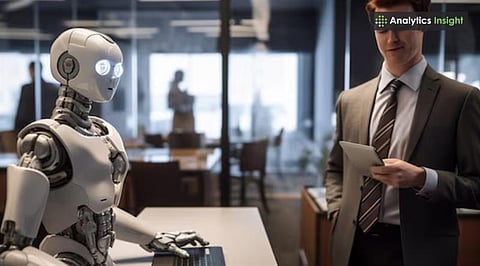

Ignoring AI in HR creates strategic blind spots, which can reduce productivity, morale, and competitive advantage.
AI streamlines workflows, from recruitment to analytics, enabling faster, data-driven, and consistent HR decision-making.
HR must lead the adoption of ethical AI, prioritizing people, collaboration, and continuous learning for workforce success.
AI is rapidly reshaping workplaces, and human resources (HR) now faces a significant dilemma. The use of advanced tools like ChatGPT is increasing productivity. However, the majority of HR departments are still not prepared, which will result in a loss of efficiency and an inability to implement the entire strategy fully.
A thorough assessment of technology identifies the areas where organizations are slow to adopt. It highlights the necessary actions that HR must take to be the first to adopt AI ethically and effectively, thereby preventing competitors from gaining a lead.
Overlooking AI in human resources is no longer a minor error. Ignoring AI has become a significant drawback in strategy. According to polls, a sizable portion of the workforce considers AI to be the least impactful factor in increasing productivity. This indicates a serious skills gap and a blind spot that drains an organization’s resources, time, and market position.
AI implemented incorrectly can lower employee productivity by up to half, leading to a decline in morale and performance. The HR department must acknowledge these threats and take the initiative to incorporate smart tools into its operations to remain present, competitive, and efficient in the modern working environment.
Also Read: How Agentic AI is Transforming the Internet Faster Than Ever
Many professionals still view AI-powered tools like ChatGPT as something distant and unrelated to their work, and hence, their impact is often underestimated.
However, AI systems are already transforming business processes, and HR has no choice but to lead the change rather than being left behind.
“In a survey, 2,000 UK workers ranked AI dead last out of 20 productivity drivers. That's not just a skills gap – it's a strategic blind spot that's costing organisations time, money, and competitive advantage,” says David Walden, via LinkedIn.
Forward-thinking organisations are leveraging AI with tangible results. For example, H&M cut its time-to-hire from 31 days to just 16 by deploying AI agents across more than 4,000 stores.
AI has been making a huge impact in HR functions, for instance, through automated interview summaries, real-time policy guidance, advanced workforce analytics, and instant language translation.
Intelligent Interview Summaries: AI can generate interview notes quickly with essential insights, ensuring consistency in the candidate evaluation process. Therefore, HR can make fast, data-driven hiring decisions without having to deal with note-taking.
Automated Recruitment and Screening: AI simplifies the hiring process by automating candidate sourcing, screening resumes, and scheduling interviews. This accelerates hiring while freeing up the HR team to focus on strategy-based decision-making and personalized communications with candidates.
Workforce Analytics for Decision-Making: AI will analyze employee performance, engagement, and retention patterns in depth. Valuable and actionable insights will be generated from the analysis, enabling HR to make informed decisions and proactively anticipate workforce challenges.
Real-Time Policy Guidelines: AI-based assistants will always be available to provide immediate replies to employee questions about policies, benefits, and compliance. This reduces the response time for HR while ensuring that accurate information is consistently distributed across the organization.
Language Translation and Communication Support: Using AI for real-time translations for global teams breaks down language barriers, increasing collaboration and training.
Also Read: AI Chatbots vs AI Agents: Which Helps Customers More Effectively?
The HR department can assist in implementing AI within the organization by transitioning from an enforcement role to one that supports its ethical and practical use.
The HR team should collaborate with the technology team to identify manual processes that could benefit from automation. They should also continuously learn by testing and observing what works, and plan for upskilling employees in response to AI's impact on productivity and workforce dynamics.
Most importantly, HR must remain on the people's side – assisting employees with navigating changes, ensuring an adoption process that is not disruptive to them, and building a culture where AI is used to enhance the human experience rather than replace it.
1. What is agentic AI in HR?
Agentic AI refers to intelligent systems that autonomously perform tasks and make data-driven decisions. Human Resources is responsible for hiring, analytics, and regulatory management. Thus, it allows teams to develop technology applications through strategic planning, employee engagement, and the ethical adoption of technology.
2. How can AI improve HR analytics?
AI amplifies HR analytics by sifting through enormous amounts of data to reveal trends in performance, retention, and engagement. It provides predictive insights to support data-driven decision-making and is equipped with a highly efficient workforce planning system that anticipates HR challenges.
3. What are the risks of ignoring AI in HR?
HR will lose the competition if AI is neglected, primarily due to slow employee hiring, decreased productivity, and a shortage of skilled workers. The organization will incur additional overhead costs, and all parties will struggle to maintain a positive work environment, simultaneously losing the competitive edge that comes with utilizing AI-driven efficiency and insights from other companies.
4. How can HR lead the adoption of ethical AI?
HR can be the champion for ethical AI by keeping the door open, sharing with employees, and partnering with tech efficiently. This includes redirecting manual processes, habitually upgrading workers, creating a culture where AI is a partner, not a rival of human potential, and developing strategies for the responsible integration of AI.
5. Which HR functions benefit most from AI?
Recruitment, workforce analytics, employee engagement, policy guidance, and multilingual communication are the primary HR functions that benefit from the application of AI. By hiring automation, the process is not only sped up but also removes the burden of decisions, introducing diversity to the organization. Real-time insights facilitate proactive management and ensure seamless operations, thereby enhancing efficiency across all departments.
